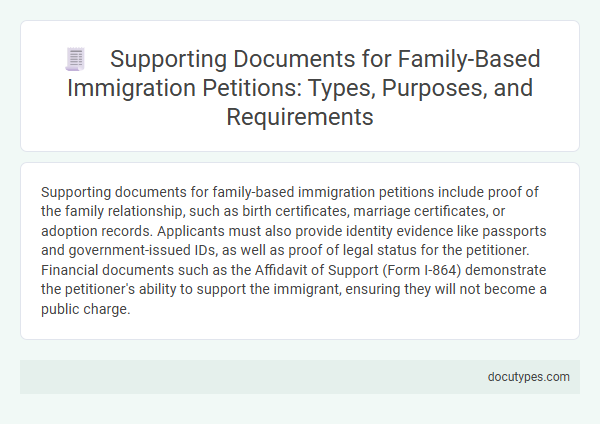Supporting documents for family-based immigration petitions include proof of the family relationship, such as birth certificates, marriage certificates, or adoption records. Applicants must also provide identity evidence like passports and government-issued IDs, as well as proof of legal status for the petitioner. Financial documents such as the Affidavit of Support (Form I-864) demonstrate the petitioner's ability to support the immigrant, ensuring they will not become a public charge.
Overview of Family-Based Immigration Petitions
| Overview of Family-Based Immigration Petitions |
|---|
| Family-based immigration petitions enable U.S. citizens and lawful permanent residents to sponsor close relatives for immigration. These petitions are categorized into immediate relatives and family preference groups, each with specific eligibility criteria and priority processing. |
| Key Petition Forms |
| The primary petition form used is Form I-130, Petition for Alien Relative. This establishes the qualifying family relationship and initiates the immigration process. |
| Supporting Documentation for Family-Based Petitions |
|
| Purpose of Supporting Documents |
| Supporting documents verify the relationship authenticity, petitioner eligibility, and prevent immigration fraud. Proper documentation accelerates petition approval and smooth visa processing. |
Importance of Supporting Documents
Supporting documents play a crucial role in family-based immigration petitions by providing evidence of the qualifying relationship and eligibility. Key documents include birth certificates, marriage certificates, and proof of legal status, which help verify the petitioner's and beneficiary's identities and relationships. Your petition's success often depends on the completeness and accuracy of these supporting materials submitted to immigration authorities.
Primary Identification Documents Required
Primary identification documents are essential for supporting family-based immigration petitions. These documents establish the identity and familial relationship between the petitioner and the beneficiary.
Commonly required primary identification documents include birth certificates, marriage certificates, and passports. These documents must be official, government-issued, and include clear identification details such as full names, dates of birth, and places of issuance.
Proof of Family Relationship
Proof of family relationship is essential for supporting family-based immigration petitions. Accurate documentation helps establish the legitimacy of the claimed relationship to immigration authorities.
- Birth Certificates - These official documents verify parent-child relationships and are fundamental in proving family ties.
- Marriage Certificates - Marriage records demonstrate spousal relationships required for spousal immigration petitions.
- Affidavits from Relatives or Community Members - Sworn statements can support claims in cases where official documents are unavailable or insufficient.
Providing comprehensive and verifiable proof of your family relationship strengthens the success of your immigration petition.
Evidence of Petitioner’s Status
Evidence of the petitioner's status is a crucial component in family-based immigration petitions. This documentation verifies the legal standing of the individual filing the petition.
Commonly accepted documents include U.S. citizenship certificates, permanent resident cards (green cards), and naturalization certificates. These papers establish eligibility and support the petition's legitimacy.
Financial Support Documentation
Financial support documentation is crucial for family-based immigration petitions to demonstrate the sponsor's ability to support the intending immigrant without reliance on public benefits. Common documents include recent tax returns, W-2 forms, pay stubs, and employment verification letters confirming income stability. You must also submit an Affidavit of Support (Form I-864) to legally commit to providing financial support throughout the immigration process.
Civil Documents and Certified Translations
Supporting documents are essential for family-based immigration petitions. Civil documents and certified translations provide official proof of relationships and identity.
- Civil Documents - Include birth certificates, marriage certificates, and divorce decrees to confirm familial connections and legal status.
- Certified Translations - Required for any document not in English to ensure accuracy and acceptance by immigration authorities.
- Your Responsibility - You must submit original or certified copies of civil documents along with accurate certified translations to avoid processing delays.
Additional Evidence of Bona Fide Relationship
Supporting documents for family-based immigration petitions often include proof of a bona fide relationship to verify the legitimacy of the family bond. Additional evidence strengthens the petition and helps immigration officers confirm the genuine nature of the relationship.
Examples of additional evidence of a bona fide relationship include joint financial records, such as shared bank accounts or jointly filed tax returns. Photographs together, correspondence, and affidavits from friends or family members can also demonstrate ongoing and authentic interactions. These documents provide contextual support beyond formal identification and legal paperwork, highlighting the real-life aspects of the relationship.
Common Pitfalls in Document Submission
What documents are typically required to support family-based immigration petitions? Commonly submitted documents include birth certificates, marriage certificates, proof of U.S. citizenship or residency, and evidence of a bona fide family relationship. Proper organization and completeness of these documents are crucial for successful petition processing.
What are frequent mistakes made in submitting documents for family-based immigration? Petitioners often submit incomplete, improperly translated, or uncertified copies of documents, which can delay or result in denial of the petition. Ensuring all documents meet USCIS standards and guidelines helps avoid processing setbacks.
How does document authenticity affect family-based immigration petitions? Submission of fraudulent or altered documents can lead to petition denial and legal consequences. Providing original or certified copies with clear authentication supports the credibility of the petition.
Why is timely submission of supporting documents important in family-based immigration cases? Failure to submit requested documents within specified deadlines can cause case delays or termination. Maintaining organized records and responding promptly to USCIS requests enhances petition success rates.
Which Documents Are Used to Support Family-Based Immigration Petitions? Infographic

